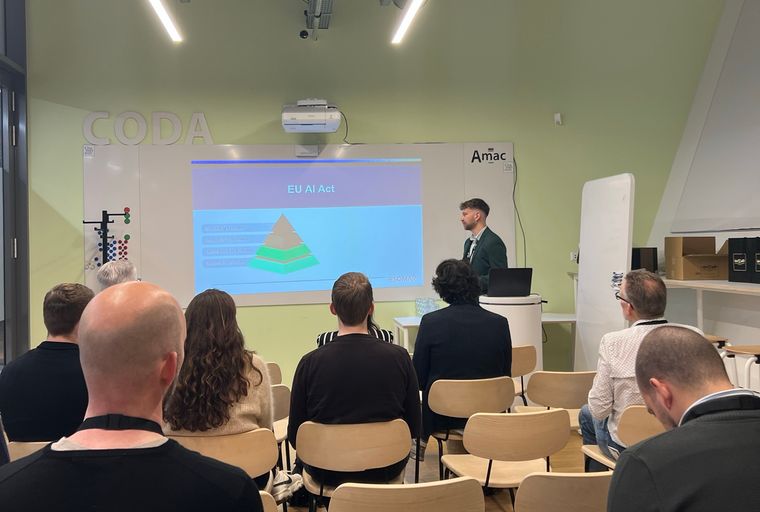AI in Action: Key Moments from MIE’24 Conference
On 13th March, I had the opportunity, as part of ESOMAR, to participate for the second time in MIE’24 in Utrecht, the Netherlands, where the common buzzword to all the sessions of the programme was (drumroll) AI!

On 13 March, I had the opportunity, as part of ESOMAR, to participate for the second time in MIE’24 in Utrecht, the Netherlands, where the common buzzword to all the sessions of the programme was (drumroll) AI!
1st half of the programme
The event opened with the keynote by Victor Knaap and Michelle McGrath from Media.Monks, titled ‘’AI Now and Next: How do you stay relevant and future-proof yourself?’’. The speakers explained what the company Media.Monks offer for the marketing and advertising sector thanks to AI, and how it helps other companies reduce the manual workload and create personalised content through its AI tool. For example, this tool offers the ability for an in-depth understanding of the customers' perspectives and sentiments without the need for lengthy questionnaires and focus groups, making the work process more time- and cost-efficient.
Immediately after, I attended the silent seminar led by Mayke Harkema from SKIM, showing "6 real-world AI applications to boost creativity, quality & efficiency in research". Taking into account the pros of AI in impacting the insights industry (e.g. inspiring and deepening research, replacing surveys) and its cons (e.g. general bias, fake responses, accuracy reliance), the speaker showed in-house AI tools to enhance creativity, speed and efficiency, and quality in the research sector. An interesting case study shown by Mayke was how AI can recognise the content and the tone of a speech and then categorise the emotion behind it.
The first part of the program culminated with a fireside chat about ‘’Adapting Market Research for the Future’’ with four important companies in the Netherlands, including Ziggo-Vodafone, Edgard & Cooper, Hema, and Gall&Gall. The speakers shared their views on how AI will impact established market research based on their experiences in the respective companies they belong to, concluding that AI is a great facilitator in making the work process more efficient. Moreover, they stated that market research agencies could adapt by providing slightly changed research methodologies to understand customer needs. However, speakers also highlighted that humans are still needed for storytelling in explaining the insights and that AI is still far from providing this service.
2nd half of the programme
Following an enjoyable lunch with colleagues in the ESOMAR boot, the second part of the program started with ‘"Harnessing the power of AI to fight survey fraud," led by Jan Gerspach from Cint. The speaker pointed out how survey fraud remains a major problem for the market research industry, with organised networks employing sophisticated technologies to emulate people and devices and evade security checks. Examples of these global organised frauds are ‘’Ghost completes’’ and ‘’Velocity attacks’’, where Cint entered a race to reach new technological frontiers like the Cint SecureServer product and Trust Score Model to surpass these fraudsters.
Finally, the day concluded with Diptish Dey, assistant professor at Hogeschool Van Amsterdam, who conducted comprehensive research on the compliance of top Dutch companies across various industries with the EU AI Act. The key findings from the research were that enterprises (unknowingly) perceive that they are AI-act compliant, with large companies being actually more compliant than SMEs. Moreover, companies, to be compliant, have to internally balance regulatory, technological, normative and value pressures.
Overall, AI is part of our everyday lives, and companies in all sectors are developing higher-tech solutions to optimise work processes and create new content to satisfy market needs. Nevertheless, it’s important to consider all the weaknesses related to AI, from the generation of bias from the data structure to the very delivery of insights. For that reason, the approval of the EU AI Act is set to become a relevant milestone in how market players adapt their businesses and develop new solutions to stay compliant with this new legislation.
Lilas Ajaluni
Market Intelligence Analyst at EsomarLilas is Italian with Syrian origins and studied Economics and Finance in Padova and did an internship next to her studies at Generali. She was, amongst other activities, responsible for qualitative and quantitative data research, its visualisation, simulation models, and preparing data for presentations to internal and external stakeholders.
She got married and immediately after moved to the Netherlands in December 2021, and worked as Strategy Analyst at Varian for 6 months.
She joined ESOMAR in March 2023, where since then, she has been responsible for developing the different reports and studies regularly published by ESOMAR’s Intelligence Unit and aggregating materials (such as bundles of academic articles, case studies and videos), internal and/or external, that support the role of ESOMAR as a thought leader that represents the data, analytics and insights industry.


